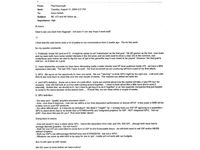AMD, Nvidia Conspire to Price Fixing; Sued
In late August of this year, a major class action lawsuit was filed in the state of California against ATI/AMD and Nvidia, alleging that the two primary graphics cards companies conspired to price fixing of GPU processors and graphics cards.
The suit was filed in the U.S. District Court for the Northern District of California and the courts have ruled that the filing may proceed. The plaintiffs are Jordan Walker and Michael Bensingor, who have filed the suite on behalf of themselves and anyone else who has been an ATI or Nvidia customer.
According to the class action filing:
"The Named Plaintiffs allege that, in violation of the federal antitrust laws, Nvidia and ATI conspired to fix, raise, maintain and stabilize prices of graphics processing chips and cards. The Named Plaintiffs also contend that Defendants unlawfully colluded to coordinate new product introductions."
Just two years ago, both AMD and Nvidia were reported to have conspired to similar antitrust behavior. According to reports from 2006, AMD and Nvidia allegedly exchanged emails between top executives in an effort to stabilize and maintain minimum pricing for both chips and cards.
Now those half truths seem to be true. Tom’s Hardware was able to obtain the legal documents for the filing as well as exhibits, showing detailed email exchanges between top ATI executives and managers and those from Nvidia. In one such email, Paul Ayscough of ATI exchanged long emails with Kevin Shuh of Nvidia, talking about working more closely together:
"We launch the GPU initiative at some industry show together. Perhaps something like Meltdown or IDF. We could even share a GPU initiative booth together to get tons of PR from the press."
Get Tom's Hardware's best news and in-depth reviews, straight to your inbox.
Another email exchange between Ayscough and Shuh even had Ayscough saying that Intel would never make a discrete GPU part, and asserted to taking advantage of this situation to bolster each other’s position in the market. As we all know today however, Intel has stepped into the graphics playground in a very big way with it’s Larrabee architecture.
In another email between Dan Vivoli of Nvidia and Dave Orton of ATI, Dan wrote:
"I really think we should work harder together on the marketing front. As you and I have talked about, even though we are competitors, we have the common goal of making our category a well positioned, respected playing field. $5 and $8 stocks are the result of no respect."
In the same email, Dan wrote:
"Both of us have spent the last three years trying to bring the perceived value of our products up to the level of Intel. The "GPU" category is clean and has served us well that way. We both have increased the price of our high end product several fold over the last 4 years while Intel’s high end prices have more than halved. Creating another category serves to work contradictory to that. How does one cleanly position it versus a GPU and a CPU?? It will tear down what we have both built."
The class action also seeks to cover triple damages, attorney fees and other costs associated with federal antitrust laws. The suite is being represented by Boies, Schiller, and Flexner LLP. The overall case will be looked over by District Judge William Alsup. The law firm indicated that those who do not wish to be represented by this suite can send in a letter to the firm by October 12, 2008 to the following address:
Request for Exclusion Form to:
In re: GPU Antitrust Litigation,
1999 Harrison Street,
Suite 900,
Oakland, CA 94612
-
DjEaZy ... o... common... and intel can't behave too?! Soooooo many antitrust cases all over the world... lets make a big hype about them too... i imagine, that intel behind this to clear the way for larabee... and why not? They can pay... and everything haz its price... so lets fantasize about that... i'm a lucky HD4870 user... and the prise was nice too... soo, lets see... intel destroys AMD with CPU pricing... and intel even don't need to to conspire with others, because intel act/is like a monopolist... intel poses a thread to AMD and nVidia... AMD can sing a blues about it... and nVidia haz sean it... so what can AMD/ATI and nVidia do... ok... they may have some aces... many patents for grapics tehnology... that's why intel have to push a a new standard GPUCPU, that's, by the way is a AMD's Fusion's concepts 1 to 1 copy... or seams so... then nVidia haz the Physix, AMD haz CPU's... intel got just badass CPU's, tons of many, monopolist attitude and a killer behavior... so it's eat or be eaten...Reply -
gxsolace DjEaZy... o... common... and intel can't behave too?! Soooooo many antitrust cases all over the world... lets make a big hype about them too... i imagine, that intel behind this to clear the way for larabee... and why not? They can pay... and everything haz its price... so lets fantasize about that... i'm a lucky HD4870 user... and the prise was nice too... soo, lets see... intel destroys AMD with CPU pricing... and intel even don't need to to conspire with others, because intel act/is like a monopolist... intel poses a thread to AMD and nVidia... AMD can sing a blues about it... and nVidia haz sean it... so what can AMD/ATI and nVidia do... ok... they may have some aces... many patents for grapics tehnology... that's why intel have to push a a new standard GPUCPU, that's, by the way is a AMD's Fusion's concepts 1 to 1 copy... or seams so... then nVidia haz the Physix, AMD haz CPU's... intel got just badass CPU's, tons of many, monopolist attitude and a killer behavior... so it's eat or be eaten...Reply
Hey djeazy Spelling or English?
On the side note, you must be blind. If Nvidia and AMD conspire together to fix prices, then it is acting like a monopolistic single body. Whether it's one company being a monopoly to control prices or a bunch of companies working together to hike or control prices, it's the same result for the consumer. Seriously, get a clue. -
Ryun Wow, AMD can't seem to ever catch a break. Since ATi was purchased in 2006 I wonder if AMD is even at fault (I don't necessarily mean legally) or if they bought the wrong GPU manufacturer, at the wrong time.Reply -
Kari woot...Reply
I love that graph, they are even comparing crossfire setups to single geforce cards in price, how lame is that. :P -
Ryun Man, wish you could edit comments, as a side note I just wanted that this whole thing makes me think of what kind of GPU manufacturers there would be in the market today had there not been price fixing.Reply -
Evolution2001 I'm no legal analyst nor accounting person. I'm just a computer end user who must not fully understand the problem here. So AMD and nVidia have been working together to release new technology at the same time. Or they have 'conspired' to keep certain pricing points. Ummm, "So?" Doesn't the automotive industry do this worldwide? They produce a product to compete in a certain price range and release them to the public at various auto-shows. nVidia and AMD do the same thing with their products at tech shows.Reply
With regards to price fixing, how much can one really complain when there is an available product in nearly every price range? From the old MX4000/Rage chips available for $10 to their high-end models in the $350+ range, where is the price fixing? Are they supposed to release newer, faster products for less than their current lineup still in the pipeline? And let's not forget the vendors that use nVidia/AMD reference designs. They need to be able to have some profit margin as well. Are nVidia/AMD going to cut the throats of the vendors that buy their chips/designs?
And lastly, AMD and nVidia are constantly going back and forth for the crown in respective areas, the same way that AMD and Intel go at it. I hardly call "one-upping the competition" price fixing or collaborating to defraud the public. How long did nVidia hold the performance crown prior to AMD finally catching up...close to a year or more? How often did we hear, "Whenever AMD ("ATI") finally releases their new chip, it had better be a good showing!" We heard it a lot for a long time. That's "collaborating"? -
Kari ryunMan, wish you could edit comments, as a side note I just wanted that this whole thing makes me think of what kind of GPU manufacturers there would be in the market today had there not been price fixing.all but one would have gone out of business because of price wars... lolReply -
the_deek I think the terms you're all looking for are collusion and oligopoly. Two competing companies should never be discussing some of the contents of those conversations in private. I think they would be in a lot less hot water had they discussed these ideas as a part of an open forum or committee. Meeting in private and closing out any potential competition is anti-competitive, regardless of whether there is any competition, you must leave the door open under U.S. law.Reply -
ravenware Hmm, I would be interested to know what product lines they feel were subject to price fixing.Reply

